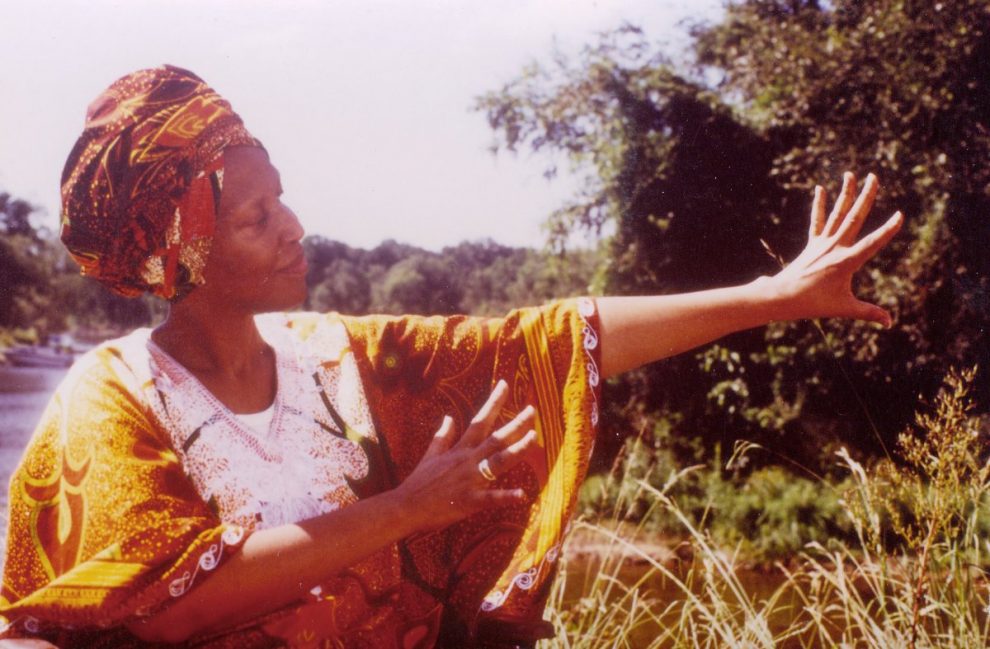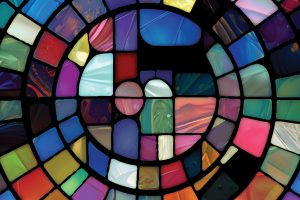“I’ve always asked God for the grace to live until I die,” says Sister Thea Bowman, F.S.P.A. And live she did. Bowman, gospel singer, evangelist, author, teacher, and recipient of numerous honors, including the 1989 U.S. Catholic Award for furthering the cause of women in the church and the 1990 Notre Dame Laetare Medal for enriching the arts, the church, and humanity, was a legend in her own time. She spent her life preaching the Good News in a way that uniquely celebrated her identity as a woman, an African American, and a nun.
Two weeks before her death on March 30, 1990, U.S. Catholic interviewed Bowman. Her words are ones of hope and courage and love: “To the suffering I say: ‘Try to reach out to others. Try to let people know how much you love them. Try to maintain a sense of humor and laughter in your life.’” To the healthy, Bowman counsels: listen to the sick, learn to read them, and be gentle.
Sister Thea will be deeply missed by the hundreds of thousands of people to whom she opened her heart. May we find hope where she did: “in scripture, in the life of Jesus, and in the lives of the holy men and women who have gone before us.”
How do you make sense out of the pain and suffering that you’re experiencing?
I don’t make sense of it. I try to make sense of life. I try to keep myself open to people and to laughter and to love and to have faith. I try each day to see God’s will. I pray, “Oh Jesus, I surrender.” I pray, “Father, take this cross away. Not my will, but thy will be done.” I console myself with the old Negro spiritual: “Sooner will be done the troubles of this world. I’m going home to live with God.”
In the meantime, I take pain medication because I don’t want my energies to be absorbed by pain. I want to be able to do what I can do the best that I can.
Is God really present in suffering?
God is present in everything. In the universe, in creation, in me and all that happens to me, in my brothers and sisters, in the church, and in the Eucharist—everywhere. In the midst of suffering, I feel God’s presence and cry out to God for help: “Lord, help me to hold on.”
Why do people have to suffer? What possible good can come from it?
I don’t know. Why is there war? Why is there hunger? Why is there pain? Perhaps it’s an incentive for struggling human beings to reach out to one another, to help one another, to love one another, to be blessed and strengthened and humanized in the process. Perhaps it’s an incentive to see Christ in our world and to view the work of Christ and to feel the suffering of Christ.
I know that suffering gives us new perspective and helps us to clarify our real value. I know that suffering has helped me to clarify my relationship—my relationship to God, how I really feel about myself, what I really want for myself, and my relationship to others. Perhaps suffering stops us in our tracks and forces us to confront what is real within ourselves and within our environment.
I have a tumor behind my right eye that causes one of my eyes to look at the ceiling and the other to look at the floor. It’s interesting how people respond to this physical phenomenon.
Some people can’t even look at me, but little children and the elderly can cut through appearances. They can cut through the pain and suffering. Maybe it’s easier for children and the elderly because they are more grounded in what is real in themselves and their environment.
Has your faith changed since you discovered you had cancer?
My faith is simpler. In many ways, it’s easier; it’s closer to home and to reality. I have more desire to grow in faith and hope and love. When I’m in pain, I know I need Jesus to walk with me. I can’t make it on my own.
Perhaps suffering stops us in our tracks and forces us to confront what is real within ourselves and within our environment.
Advertisement
I pray, “Lord, I believe. Increase my faith. Help my unbelief.” I remember the words of an old song: “We’ve come this far by faith, leaning on the Lord, trusting in his words. The Lord has never failed us yet. Oh, can’t turn around because we’ve come this way by faith.” The prayer of faith somehow sustains me.
Has your image of God changed?
I was reared in the traditional Black community—in song and prayer and conversation and stories. My people graced me with multiple images of the living God. God is bread when you’re hungry, water when you’re thirsty, a harbor from the storm.
God’s a father to the fatherless, a mother to the motherless. God’s my sister, my brother, my leader, my guide, my teacher, my comforter, my friend. God’s the way-maker and burden-bearer, a heart-fixer and a mind-regulator. God’s my doctor who’s never lost a patient, my lawyer who never lost a case, my chaplain who never lost a battle.
God’s my all in all, my everything. God’s my rock, my sword, my shield, my lily of the valley, my pearl of great price. God’s a god of peace and a god of war. Counselor, Emmanuel, redeemer, savior, Prince of Peace, Son of God, Mary’s little baby, wonderful Word of God.
These images come from scripture and from meditations of Christians. Some people see them as contradictory, but Christians see them as inadequate—all of them. But all these images are available to me. I meditate on each one of these images on a particular day at a particular time. Each one corresponds to a particular need. All these images help me as I call upon God’s name.
So I would say that my image of God has not changed. I’ve always had multiple images of God, and I’ve tried to meditate and pray using the images that help me. I try to rely on God’s mercy and compassion, God’s strength and power, God’s nearness to me, God’s profound love.
Does God seem farther away or closer to you know?
God seems closer. I used to feel I could depend upon myself. I used to feel that I could make you a promise and that I could keep a promise. I could tell you that I would be coming to Chicago on a certain date, and I would board a plane and be there. That I might not be able to make the trip would scarcely cross my mind.
I was reared in the traditional Black community, and I was taught that death was a part of life; it’s going home.
Advertisement
I used to say, “It’s all in God’s hands.” But only now do I really know what those words mean, because I’ve experienced them. I’m so much more grateful than I used to be. I woke up this morning, and I could move my legs—I say, “Thank you, God.” I woke up this morning and the pain was less than it was a day or two ago—I say, “Thank you, God.” I used to take my body for granted.
What other ways have you experienced God’s healing?
I’m more at peace. I love people. People have love for me. The love they have shown me during my illness, their human love, is somehow a manifestation of the love God bears me. Because I’m sick and needy and dependent, people are more willing to tell me they love me and I’m more willing to tell them I love them. The love between us is healing.
There are many things that I used to worry about and get agitated and upset about, but now I realize that they just don’t matter. In many ways, I’ve become more patient and tolerant. I’m more caring. I can’t do for people in ways that I used to do, but I’m more understanding. I have more time to think, meditate, and learn.
What words of encouragement do you have for others who are suffering?
I think of these words from an old song: “Hold on just a little while longer. Everything is going to be all right.”
To the suffering I say: Try to reach out to others. Try to let people know how much you love them. Try to maintain a sense of humor and laughter in life. Try to keep in touch with children and the elderly. Talk about what you’re thinking and what you’re feeling. Talk about what you need and what you want. Talk about what you see, and talk about your experiences. Invite people to share a prayer with you.
Generally, let people know where you are. Often folks will stand around waiting and wanting to help. Only you, as the sick person, can tell them what they can do.
Sometimes people who are sick are afraid to admit their needs, aren’t they?
Yes, but we must give people an opportunity to help us. It’s hard to do. I think of when Jesus says, “Whatever you do for the least of mine, you do for me.” It’s hard to give like that, but sometimes it’s harder to be on the receiving end accepting someone’s help.
How can healthy people treat the sick better?
It’s important for the healthy to listen to the sick. They should ask: “How can I help? What can I do? Would you like me to sit with you a while? What do you need? What do you want? Are you tired? Do you need to rest?” These seem like really simple questions, but they are seldom asked.
If and when the questions are asked, it’s also important for the asker to listen to the answer. Somebody came to visit me a while ago and asked, “What do you need?” I said, “Some grapefruit.” So the person went out and bought grapefruit and plums and apples and bananas. It was nice, but all I wanted was grapefruit. That’s what I mean about listening to what the sick person asks of you.
Learn to read the sick. If you’re perceptive, you can tell when someone is tired and needs rest. Forget your own agenda when you go to visit a sick person. If the sick person is having difficulty talking, for example, unless you’re sure he or she has something to say and wants to talk, don’t make the person talk and don’t put the sick person in situations where he or she has to talk.
The healthy must understand that the sick are very sensitive—sensitive to noise, sensitive to touch. People will come and pat me, but because I have bone cancer, I’m very sensitive to touch. So people won’t even realize that they’re hurting me. Read the sick person’s face and body language. Try to understand where the sick person is coming from. Be sensitive to the need for a quiet and peaceful environment. Don’t overload sick people with distractions and noisy actions. Be gentle.
In the Black community, the old folks’ teaching was that you could serve the Lord until you die. I’m still able to serve the Lord when I love somebody, when I reach out, when I say a word of encouragement, when I smile.
Advertisement
Be sensitive to the sick person’s caretaker, too. Ask the caretaker if he or she needs help cooking meals or needs time to rest. Another thing: Don’t offer to help if you don’t want to help. Don’t make promises you can’t keep because the sick person and the caretaker will wait for you.
What if someone says, “I want to help, but I just don’t know how?”
Then it’s up to the sick person to say what he or she really needs. My advice to sick people is: tell people what you really want. I used to be reluctant to do that, but if someone wants to do something for you, that person is going to do it regardless; so the best thing to do is to tell someone straight-forwardly what would be the most helpful thing to do. I might say, “Pray with me,” or, “Just sit with me a while.” Or I might need someone to read to me or rub my foot.
The basic thing that I’m saying to both the sick and the healthy is: Keep the lines of communication open. Otherwise some things that need to be done remain undone or things that are done are not helpful or are actually hurtful.
Isn’t it difficult at times to know what you need?
Between the sick and the caretaker, between Dorothy [Sister Dorothy Ann Kundinger, F.S.P.A.] and me, for example, we’ve learned to anticipate that there are certain people who will want to help, so we prepare ourselves. Then, when somebody asks what he or she can do, we know what to say.
So the sick and the well do have something to offer each other?
Yes. The two can offer each other love, comfort, laughter, perspective. Illness can distort perspective, and the person who is sick needs the perspective of the well community. I need the perspective of little children and the elderly and of people who are out facing life every day. But illness also helps clarify perspective. People who are well can learn from the sick new ways of thinking, relating, and accepting.
Sick people can teach the well an appreciation for health and movement and life. The sick can share insight into what it means to live, what it means to suffer, what it means to face death.
The lines from a traditional song from the Black community come to mind: “I’m going to sit at the welcome table. I’m going to drink from the golden fountain. I’m going to my sainted mother. I’m going to meet with my friend Jesus one of these days.” Or another one that says, “I’m going to put on my robe and tell the story of how I made it over as soon as I get home.”
Should Christians fear death?
I was reared in the traditional Black community, and I was taught that death was a part of life; it’s going home.
You hear this belief in the old songs: “Swing low, sweet chariot, coming for to carry me home.” Or “Deep river, my home is over Jordan.” Or “Stand still, Jordan: I’ve got a mother in glory; I’ve got a father in glory, and I can’t stand still.” Or the song I sang at my mother’s funeral and my father’s funeral: “I’ve done my work; I’ve sung my song. I’ve done some good; I’ve done some wrong. And now I go where I belong. The Lord has willed it so. He knows my heart, and he knows best. He will not harm where he has blessed. And so I go to take my rest where sweet wild roses grow.”
I also think of the lines from scripture: “O death, where is thy sting? O grave, where is thy victory?” We have been purchased at a great price. We are our heavenly Father’s children, and Jesus promised to prepare a place for us. I really believe that in death God calls us home.
Of course, there is the uncertainty. Nobody ever came back to tell us what it was like. But why should I fear my king, Jesus? Why should I fear going home? I feel pain. I don’t know what my death will be like. But again, I ask God for strength, and I have Jesus.
As the song says, “When I’m dying, Lord, walk with me.” I try to hope and I try to love and I try to trust and I try to get ready.
Is it difficult when you have too much time to get ready?
Yes. It’s been six years that I’ve had cancer. Until November of last year, I was still very active. It’s just since then that sometimes I feel like saying, “Either let me get out or take me home.”
I’ve always asked God for the grace to live until I die. My hope is that I will still be able to do that. I try to minister as best I can.
In the Black community, the old folks’ teaching was that you could serve the Lord until you die. I’m still able to serve the Lord when I love somebody, when I reach out, when I say a word of encouragement, when I smile.
Instead of just waiting, I’m trying to share the Good News as long as I can. I believe it’s possible to do that as long as I’m conscious.
I find my ministry in the way I relate to people who come to visit me or call me or who administer my health care and radiation. If I can smile and get a smile back, that’s my ministry. As a sick person, I can also listen. That’s a ministry that many people hunger for. Active people often don’t realize how important listening is.
My ministry is very different from what I used to do, but it’s the most I can do right now. Whatever I can do, if I do it in Jesus’ name, it’s acceptable and satisfactory.
What do you do to keep the pain from consuming you?
Prayer helps me. A song helps me. Music in the environment helps me. The presence of people who love and understand me helps. Just to have somebody hold me helps. And the medication helps. I say that because I know many people are reluctant to take pain medicine—I was, too, for a while. But I realized that the medicine can free me. If I take the pain medication, I can do things that I cannot do without it. So I look at the medication as God’s gift as long as it’s helpful to me.
There are also some people who have a healing, calming, and comforting presence. Just their being with me makes me feel better. They send out positive vibrations. Some others can send out negative vibrations. That’s why when you go to visit someone’s who sick, you should sit down and make peace with yourself and with your own soul. That way you can go to the sick person with a calm and quiet spirit.
Are there times when you don’t have a prayer inside you because of the pain?
Yes. That’s when having song in the environment is especially helpful. So much of the music I love is the music of prayer, and the music can prayer for me. Music is very much a part of my tradition and my life.
At these times, it’s also very helpful to have somebody who loves me there. People can pray with me and they can pray for me.
So prayer really helps?
It helps me.
Who else do you pray to besides God for strength?
I believe in the communion of saints. I pray to many saints, depending on the day and the hour—St. Peter, St. Francis, St. Thomas More.
I prayer to Jesus’ mama, the Blessed Virgin. I pray to St. Augustine and St. Monica. I pray to my mother and father who have gone before me and who love me and are close to me. I pray to other dear friends who have gone before me. I believe that they have their feet before the throne of grace, and I believe that those who loved us in life love us even more perfectly in death and that they are concerned about our struggle.
So I say, “Mama, please pray for me. Mama, please help me.” My mama was sick for many years, and she lay in this same room. She understands so much of what I’m going through, so I say, “Mama and Daddy, pray for me; help me to hold out.”
I know that God is using me in ways beyond my comprehension. God has given me the grace to see some of the seeds that I have sown bear good fruit, and I am so grateful.
I pray for the children, that they may be saved and sheltered and nourished. I pray for the church and all the members of the church that they may be empowered to do the work of the church. I pray that all members of the church be united in their efforts to preach and to teach, to worship and to pray, to heal, to comfort, to reconcile, to feed, to nourish, and to raise the dead.
I pray for people who are needy, who hurt, who are alone, who are lonely. I pray for the ones who are discouraged and addicted. I prayer for the many people who have asked for my prayers. I pray for an end to hunger and poverty and violence. I pray for world peace, for the coming of the kingdom of God. I pray for the children, that they may feel good about themselves and that they may love themselves enough so that they can reach out to others.
I pray that we may learn to reach across boundaries of race, nationality, class, and status and love and help one another. I pray that we create a holy city where they will know us because we love one another.
Have your prayers changed since you became ill?
My prayers haven’t really changed since I became ill, but I find that now I have more time for prayer, I take more time for prayer, and I’m more concerned about my prayer life.
Where do you find seeds of hope?
I find seeds of hope in scripture. I find the seeds of hope in the life of Jesus and in the lives of holy men and women who have gone before us. I find seeds of hope in the efforts of the church toward empowering people to do the work of the church. I find seeds of hope in the children as I see them grow up with love for themselves.
Do you find hope in yourself?
I know that God is using me in ways beyond my comprehension. God has given me the grace to see some of the seeds that I have sown bear good fruit, and I am so grateful.
Do you ever despair?
What for? I don’t despair because I believe God leads me and guides me, and I believe that I can reach out for God’s hand. I have received such love and so many gifts. That’s a part of what I hope at this time in my life to be able to share. I want to say to people just keep on keeping on.
Image: Franciscan Sisters of Perpetual Adoration, fspa.org













Add comment